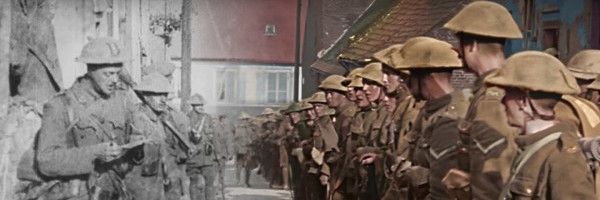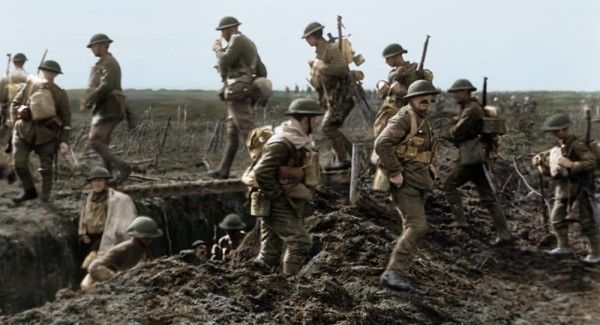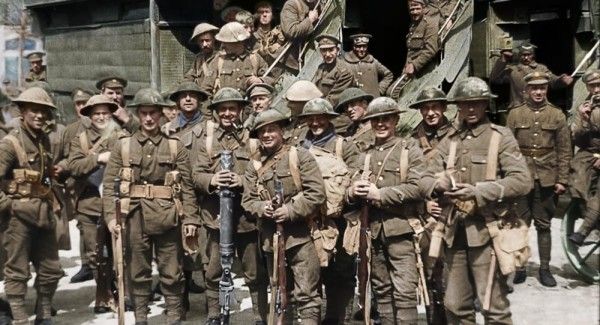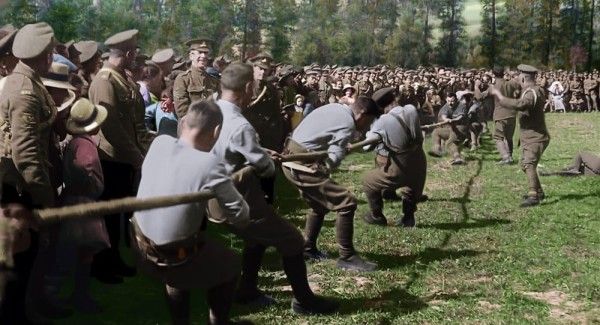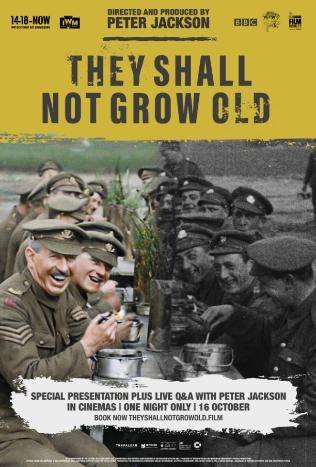Peter Jackson's World War I documentary They Shall Not Grow Old is not an easy movie to watch, but it is a necessary one. Technologically impressive, historically important, and equal parts inspiring and damning when it comes to the human condition, the stunning filmmaking achievement documents the lives of soldiers fighting in World War I and brings their stories to life using archival historical footage restored to near high-definition standards, complete with hand-colorized updates. The WingNut Films production, complemented with archival material provided by the BBC and London’s Imperial War Museum, already set a record as the highest-grossing U.S. cinema event to date when it debuted late last year, but now it's opening in earnest in the U.S. starting this Friday.
The film is part of the World War I centenary’s official program of cultural events known as “14-18 NOW”, funded by contributions from the British lottery, the government’s department of culture, and the Arts Council; They Shall Not Grow Old will also be distributed to all of Britain’s secondary schools after release. But if you're remotely interested in military culture, world history, and an unbelievably intimate look at the lives of soldiers on the Western Front 100 years ago, or find yourself in need of a harrowing reminder of the horrors of war, take my word for it and seek it out in a theater near you this February 1st.
Our preview screening was preempted by Jackson himself who explained the film we were about to witness (in 3D, mind you). While I hope this preamble plays in front of the movie in theaters this weekend, in case it doesn't, I'll recap his comments here. Jackson explained that he was given free rein when it came to the narrative, the only restrictions being that he used the archival footage, recordings, and other content made available to him. He opted to narrow his focus to the British soldiers and their journey from pre-war life, to recruitment, to service and combat, to their eventual return home, for those who survived the horrors of war. However, Jackson also mentioned the myriad of other important historical events that took place during the campaign, like the women who occupied vital roles in the work force, the other major battles around the world, and the political forces behind the conflict. It was important for him to limit the scope of the narrative and to tell the story, not in the traditional military documentary style full of names, dates, and landmarks, but through the voices of the soldiers themselves. Interviews of World War I veterans, taken in the 1960s and 1970s, are the only voices heard as the film's narrators throughout, retelling of their experiences; professional lip-readers and voice actors also add matching dialogue to the restored footage throughout the film, though the technique is used sparingly.
Jackson also previously confirmed that though computer technology may have smoothed the transitions between the frames of the old film strips, none of the visual material presented was created by the production team. Instead, the century-old film stills have been restored and colorized, with modern audio filing in the sensory gaps.
Here’s what Jackson had to say about the project:
“We’re making a film [that is] not the usual film you would expect on the First World War. We’re making a film that shows this incredible footage in which the faces of the men just jump out at you. It’s the people that come to life in this film.”
This is all to say, go into They Shall Not Grow Old expecting a technological marvel the likes of which you've never seen before, but also be prepared for a difficult emotional journey. This ain't your grade school history class war documentary. This is a deeply personal and intimate look at the lives of soldiers, men as young as 14 to as "old" as 19 in most cases, who signed up for the war effort out of patriotic duty, with some paying the ultimate price. Obviously, the men telling us of their experiences throughout the film are those who made it home alive, but not all did so in one piece. And those lucky few who did still carried the psychological scars and nightmarish memories from the experience. This film simultaneously rekindles a deep appreciation for their sacrifices (and for veterans of more modern wars and soldiers still serving today) while also reminding us of the human toll, senseless carnage, and man's inhumanity towards their fellow man in the arena of war.
Jackson's narrative here is not typical. This isn't a war film through the lens of Steven Spielberg, who even in his most realistic and dire depictions of military combat avoids the more gruesome aspects of death and decay. Neither is it the gore fest of a Mel Gibson war movie, which heightens the violence in dramatic fashion. That's not to say Jackson has or should take credit for the style here, it's simply that his crafted narrative lets everything play out in as realistic a way as possible because it's comprised of actual film footage and photographs taken by the men on the front lines and in the trenches. Audiences won't get to follow named soldiers of all ranks, races, and creeds through the war because this isn't the tale of one hero's journey or even a heroic squad of soldiers. It's a tale told on the level of the individual, the unit, the battalion, and the whole army itself as these young men are drilled into shape before being shipped off to the front. And for the most part, it's all fun and games until about halfway through the feature.
The footage does not shy away from the realistic violence that took place in No Man's Land. Machine-gun fire, mortars and anti-personnel rounds, the effects of poisonous gas, and deaths by bayoneting, garotting, and gunfire are all highlighted in one way or another, accompanied by the dying, dead, and decomposing corpses of man and beast alike on screen; animal lovers, especially those of you who are fond of horses, will find some tough moments in this film. But it's the fact that we get to see these flesh-and-blood soldiers in their prime, living together in less-than-ideal conditions for days, weeks, and months before they march stoically to their own deaths in a matter of moments that really drives the message home in this piece. Seeing the faces, the mannerisms, the flaws and imperfections of real people that are often lost or glossed over in dramatic fictions makes this depiction of war feel all the more real, all the better to never forget this Hell on Earth and the men on both sides who fought in it.
They Shall Not Grow Old is, at once, a technical marvel of historical importance, a deeply moving personal story of real-world heroes, and a timeless reminder that the atrocities of war must necessarily be avoided at all costs.
Rating: A

